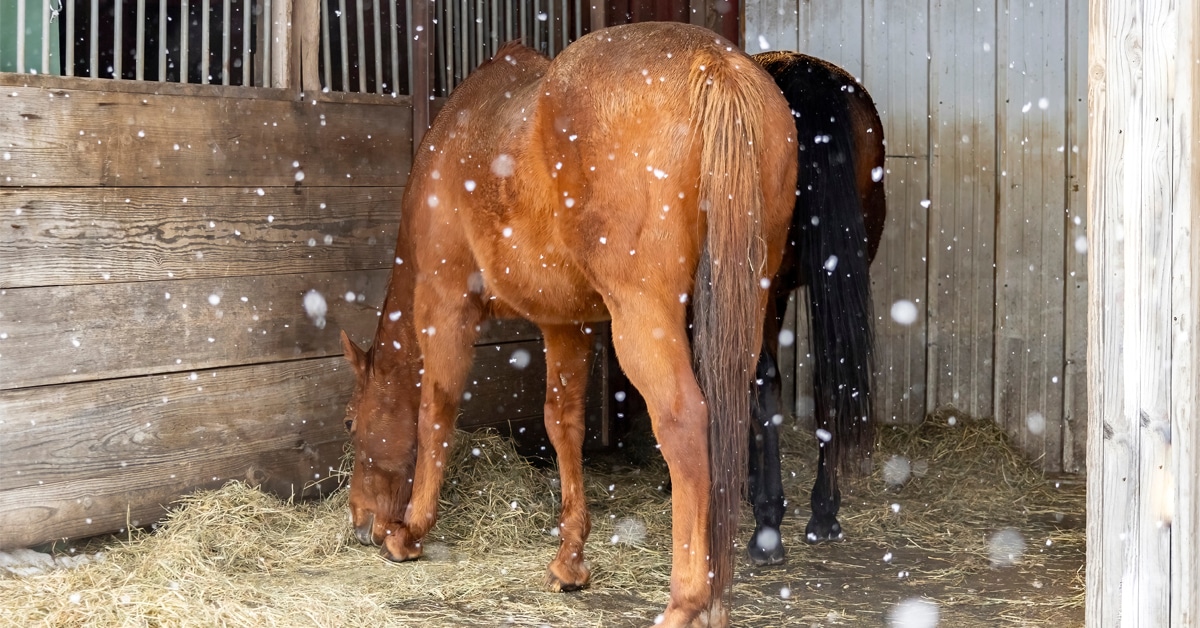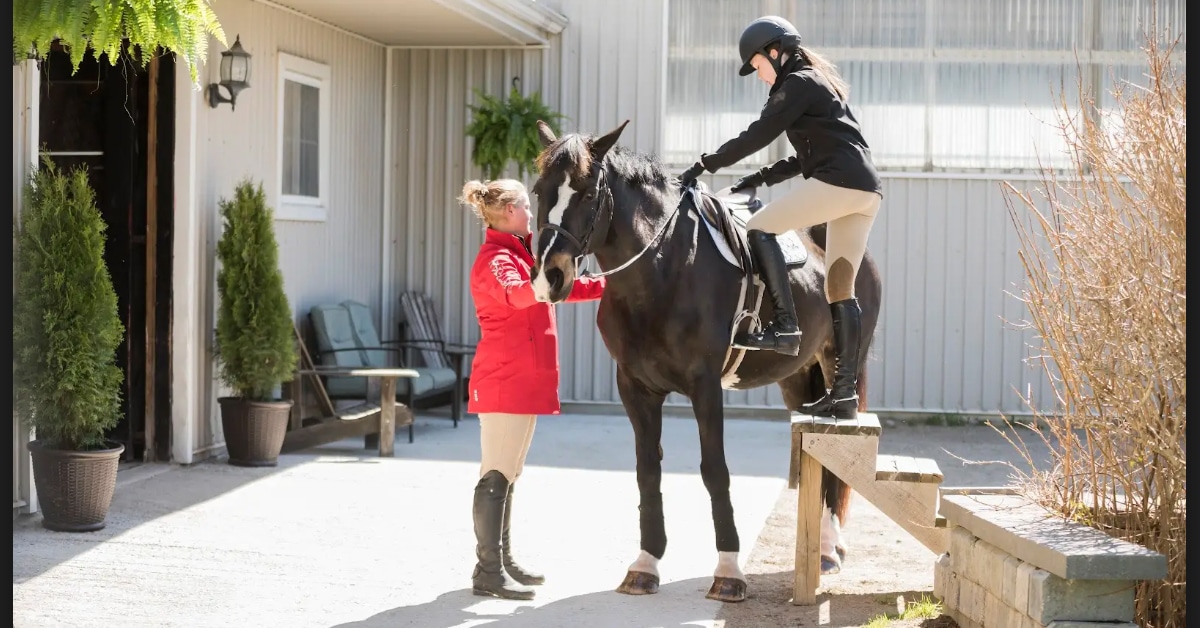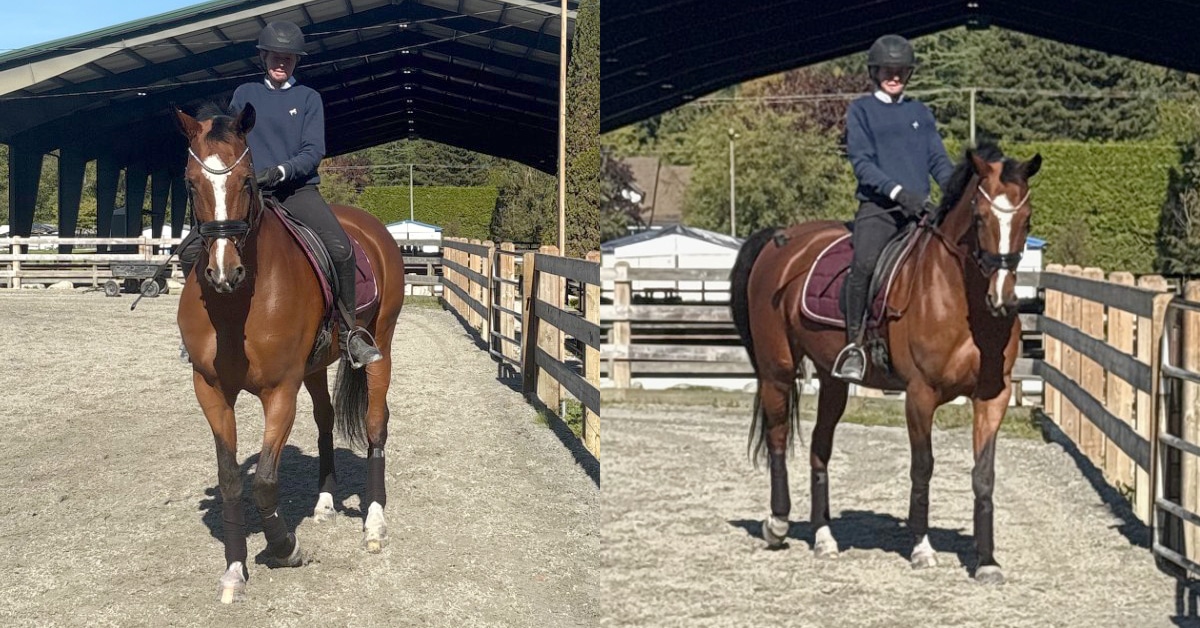Cough. One sound that is sure to make a horse owner snap to attention is a coughing horse. Does he have a simple cold that will clear up in a few days, or is it something more serious? Here are some common respiratory issues, how to manage them, and more importantly, how to prevent them.
Viral Respiratory Disease
Viral respiratory infections including equine herpesvirus infection (rhinopneumonitis), equine influenza, and equine viral arteritis are common in horses. Symptoms include:
- harsh, dry cough
- fever of 38.5°C-40°C (37°C-38°C is normal)
- runny nose
- loss of appetite
- depression
- muscle stiffness
Your veterinarian may run blood tests and/or nasal swabs to determine the strain, but since all three are contagious, the sick horse should always be immediately isolated from his stablemates until his symptoms have disappeared, especially if there are pregnant mares in the barn, as rhinopneumonitis virus can cause abortion.
Most horses recover from a simple viral respiratory infection on their own with a few weeks’ rest. However, complications such as secondary bacterial infections (sinusitis, bronchitis, and pneumonia) may set in because viral infections can impair respiratory defense mechanisms. Be on the alert for persistent coughing and yellow-green sputum or nasal discharge, as antibiotic treatment might be necessary.
Non-Infectious Respiratory Disease
Inflammatory airway disease (IAD) is characterized by excessive mucus in the trachea, airway hyperresponsiveness (increased sensitivity), and poor exercise performance. Heaves, also known as Chronic Obstructive Pulmonary Disease (COPD), equine asthma, or Recurrent Airway Obstruction (RAO) is triggered by exposure to dust, mold, and ammonia from urine and manure, generally in older horses prone to allergies, where their airways are obstructed due to bronchoconstriction and excessive mucus production.
Symptoms of heaves include:
- dry cough at the onset of exercise
- wheezing
- increased respiratory rate (more than the normal 10-16 breaths per minute)
- flared nostrils
- nasal discharge
- laboured breathing at rest (severe cases)
- strenuous efforts to exhale may create a “heave line” – a groove running along the abdominal muscles
- weight loss
Severe or frequent attacks may need to be treated by your vet with medication (anti-inflammatories and inhaled bronchodilators or corticosteroids). You can help ease symptoms by turning the horse out on pasture as often as possible (although hot, humid weather makes the symptoms worse), wetting his hay or replacing it with cubes or pellets, making sure the stable is well-ventilated, and keeping his stall clean and bedded with dust-free wood shavings or peat moss instead of straw or sawdust.
Shipping Fever (Pneumonia)
Shipping fever – pneumonia associated with transport – is triggered by either a viral or bacterial respiratory tract infection. Pneumonia may begin as an influenza or herpes virus infection, which can predispose the horse to a bacterial infection. The increased dust and immune system-suppressing stress associated with travel can create an environment that makes the horse more susceptible to disease.
Exercise-induced pulmonary hemorrhage may also be a contributing factor, especially with high-intensity sports such as eventing, allowing bacteria to thrive in blood in the lungs.
Symptoms which appear several days after being shipped include:
- fever
- depression/lethargy
- runny nose
- lack of appetite
- coughing and difficulty breathing
- elevated respiratory rate
Your vet should be alerted and the horse should be isolated for up to two weeks while rest and supportive care are administered. If he stops drinking, he may need intravenous fluids; anti-inflammatory drugs such as Banamine (flunixin meglumine) can help reduce his fever. If the pneumonia is a bacterial strain, it can be treated with antibiotics. Occasionally, lung abscesses or chronic pneumonia can result which may limit or end the horse’s competitive career.
One of the best methods of preventing shipping fever is simply to allow the horse to lower his head in the trailer so mucous can drain naturally. Alternatively, frequent rest stops to give him the opportunity to do so will help, as will keeping the travel environment as dust- and ammonia-free as possible.
Preventive Measures
While vaccination is available for equine influenza, viral rhinopneumonitis, equine viral arteritis, and strangles, much like the human flu vaccine, they do not always prevent the horse from becoming sick, but will often lessen the duration and severity of the disease. Make sure your horse is on a vaccination schedule suited to your area and his lifestyle.
Biosecurity is key to preventing the spread of disease. Ideally, any new horse coming onto the farm should be isolated for two weeks. Respiratory disease can be spread through horse-to-horse contact, buckets, hoses, tack, grooming tools, even human hands. All equipment, stalls, and trailers must be thoroughly disinfected before reuse.
Soaking/Steaming Hay
Dry, dusty hay can trigger or exacerbate respiratory problems in horses, especially if it contains any mold. Soaking or steaming hay can be beneficial; soaking can be done by simply spraying it with a hose prior to consumption, or allowing it to sit in water for 30-60 minutes (no longer, or the nutrients can leach out). Steaming hay in a steamer can decrease dust and kill mold with heat, with less loss of minerals than via soaking.
The Natural Path
While homemade cough syrups and natural or homeopathic remedies should never replace veterinary care, there are supplements on the market which can be used alongside. Over-the-counter treatments may not cure your horse, but they may ease his symptoms to some degree. Always talk to your vet before giving your horse any cough remedy.
Omega Alpha Pharmaceuticals Inc. offers four products specifically tailored to equine respiratory health. Airwaves™ contains peppermint, eucalyptus, and nettles and acts as a bronchodilator and a cough suppressant for horses with heaves, while the anti-histamine action of nettles helps alleviate allergic symptoms. Lung Flush™ supports normal lung function using rosemary and other herbs known to increase blood flow in capillaries in the lungs that helps remove toxins and aids in drainage. The soothing formula of Herba Coff™ can be used to treat persistent dry coughs due to allegic reactions or colds. Respi-Free™ combines Airwaves, Lung Flush, and Herba Coff to aid severe breathing problems such as COPD/heaves.
Purica’s Recovery®EQ is a performance and wellness supplement for horses that improves overall health by increasing the circulation of nutrients to affected cells and extracellular structures. It may be used in combination with prescribed medications when treating respiratory illness such as COPD. Purica also suggests that supplements that curb the production of histamines in the tissues, such as bioflavonoids, have been reported to inhibit the release of histamines. Antioxidant vitamins A, C, and E can also be helpful for horses suffering from COPD to help combat free radical damage and promote tissue repair.
Most importantly, get in the habit of taking your horse’s vital signs while he is healthy so you know his ‘normal’ and can spot problems the moment they arise.
The Latest









